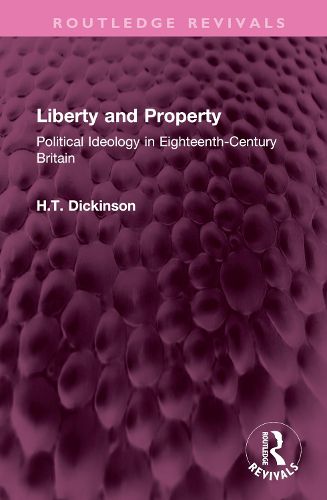Readings Newsletter
Become a Readings Member to make your shopping experience even easier.
Sign in or sign up for free!
You’re not far away from qualifying for FREE standard shipping within Australia
You’ve qualified for FREE standard shipping within Australia
The cart is loading…






First Published in 1977, Liberty and Property is a pioneering book which covers a long period, from 1688 to 1790 and beyond, and makes a major contribution to our understanding of eighteenth-century British politics. The relationship between political ideas and political reality is difficult to define. Consequently, historians seldom attempt to link thought and action, but concentrate solely upon the facts of a given political situation. In this book H.T. Dickinson has succeeded in redressing the imbalance. Taking as his theme the ideas and arguments used to defend or reform the constitution and political order in Britain, he combines what men wrote and said with what they actually did. His achievement is to have opened up an entirely new avenue of eighteenth-century British political history.
The author bases his study on a wealth of contemporary evidence, much of it previously untouched. It includes the treatises of all major political thinkers and propagandists, all reported parliamentary debates from 1688 to 1800, literally thousands of pamphlets, sermons, magazines and newspapers, as well as an abundance of politically conscious literature by writers such as Addison, Swift, Steele, Pope and many others. This is a must read for scholars of political history, British political history and political studies.
$9.00 standard shipping within Australia
FREE standard shipping within Australia for orders over $100.00
Express & International shipping calculated at checkout
First Published in 1977, Liberty and Property is a pioneering book which covers a long period, from 1688 to 1790 and beyond, and makes a major contribution to our understanding of eighteenth-century British politics. The relationship between political ideas and political reality is difficult to define. Consequently, historians seldom attempt to link thought and action, but concentrate solely upon the facts of a given political situation. In this book H.T. Dickinson has succeeded in redressing the imbalance. Taking as his theme the ideas and arguments used to defend or reform the constitution and political order in Britain, he combines what men wrote and said with what they actually did. His achievement is to have opened up an entirely new avenue of eighteenth-century British political history.
The author bases his study on a wealth of contemporary evidence, much of it previously untouched. It includes the treatises of all major political thinkers and propagandists, all reported parliamentary debates from 1688 to 1800, literally thousands of pamphlets, sermons, magazines and newspapers, as well as an abundance of politically conscious literature by writers such as Addison, Swift, Steele, Pope and many others. This is a must read for scholars of political history, British political history and political studies.